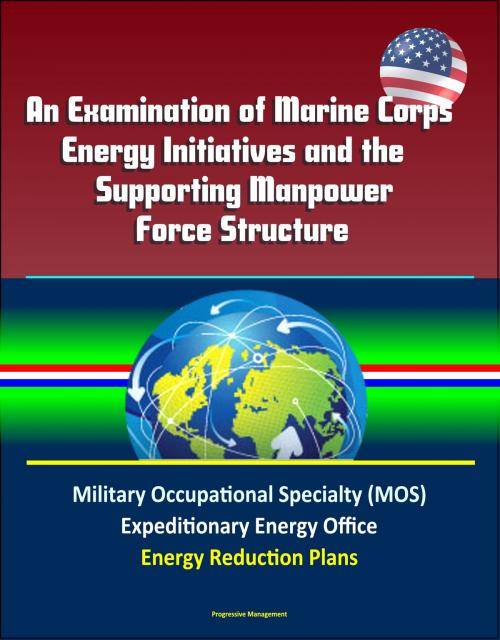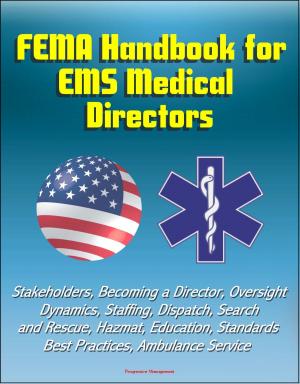An Examination of Marine Corps Energy Initiatives and the Supporting Manpower Force Structure - Military Occupational Specialty (MOS), Expeditionary Energy Office, Energy Reduction Plans
Nonfiction, Science & Nature, Technology, Power Resources, History, Military, Weapons| Author: | Progressive Management | ISBN: | 9781370613403 |
| Publisher: | Progressive Management | Publication: | October 24, 2016 |
| Imprint: | Smashwords Edition | Language: | English |
| Author: | Progressive Management |
| ISBN: | 9781370613403 |
| Publisher: | Progressive Management |
| Publication: | October 24, 2016 |
| Imprint: | Smashwords Edition |
| Language: | English |
This excellent report has been professionally converted for accurate flowing-text e-book format reproduction. This research is in response to a request from the United States Marine Corps Expeditionary Energy Office. The Marine Corps has identified its reliance on energy resources as a real threat to military security and a drag on the logistics tail of expeditionary operations. This research recommends that the Marine Corps prioritize development of the existing Unit Energy Manager program to address operational energy capability requirements. Long-term solutions require updating existing formal training and education standards and assignment of a new free military occupational specialty on the Marine Corps tables of organization. The Expeditionary Energy Office and Marine Corps Installations Command have stood up to centrally manage policy and directives for Marine Corps energy management; however, the organization has not institutionalized mission essential tasks nor developed personnel training in order to field operational energy managers to the fleet. This research identifies the federal and military policies and guidance in place to manage operational and installation energy issues, as well as the manpower billets in place to support centralized management. The research further examines the existing force structure that supports training of energy management professionals within the Marine Corps.
CHAPTER I - INTRODUCTION * A. BACKGROUND * B. PROBLEM * C. PURPOSE * D. RESEARCH QUESTIONS * 1. Primary Question * 2. Secondary Questions * E. SCOPE * F. ORGANIZATION OF THE STUDY * CHAPTER II - BACKGROUND AND LITERATURE REVIEW * A. INTRODUCTION * B. BACKGROUND * 1. Overview of Policy and Directives * 2. Energy Reduction Plans * 3. Cultural Change * a. Leadership * b. Ethos and Cultural Shifts * c. Individual and Organizational Behavior * 4. Awards and Recognition Programs * 5. Management Theory and Practice * a. International, Corporate and DOD Management Theory * b. DOD & Marine Corps Current Energy Management Practices and Guidance * c. Organizations with Management Responsibility - Bases and Battlefields * 6. Training and Education * a. HQMC Funded or Approved Courses * b. Naval Postgraduate School * c. Civilian Accreditation * C. LITERATURE REVIEW * 1. Navy and Marine Corps Classifications * 2. Behavioral and Cultural Change * 3. Work Force Management * D. CHAPTER SUMMARY * CHAPTER III - DATA AND PRELIMINARY ANALYSIS * A. MARINE CORPS TOTAL FORCE STRUCTURE PROCESS * 1. Marine Corps MOS Manual - NAVMC 1200.1A with Change 1 * a. MOS Manual Definitions and Business Rules * b. Military Occupational Specialty Requirements * 2. Selected MOSs Relevant to Energy Management * a. Occupational Field 04, MOS 0402 Logistics Officer (2ndLt to LtCol) * b. Occupational Field 06, MOS 0602 Communications Officer (2ndLt to LtCol) * c. Occupational Field 11, MOS 1120 Utilities Officer (WO to CWO5) * d Occupational Field 13, MOS 1302 Combat Engineer Officer (2ndLt to LtCol) * e. Occupational Field 13, MOS 1310 Engineer * Equipment Officer (WO to CWO5) * f. Occupational Field 13, MOS 1330 Facilities Management Officer (2ndLt to Gen) * g. Occupational Field 13, MOS 1390 Bulk Fuel Officer (WO to CWO5) * h. Occupational Field 35, MOS 3510 Motor Transport Maintenance Officer (WO to CWO5) * 3. Training and Readiness (T&R) Manuals * a. NAVMC3500.12B with Changes 1-4, Utilities and Engineer Training and Readiness (T&R) Manual * b. NA VMC 3500.27B Logistics Training and Readiness (T&R) Manual * c. NA VMC 3500.56B Communications Training and Readiness (T&R) Manual * d NA VMC 3500.39C Motor Transport Training and Readiness (T&R) Manual * B. DATA SOURCES * 1. Tables of Organization * 2. MOS Precedents * 3. Energy Management Organizational Structure of E2O and MCICOM * 4. Unit Energy Manager Analysis * C. EXISTING TRAINING AND EDUCATION ASSETS * 1. Naval Postgraduate School
This excellent report has been professionally converted for accurate flowing-text e-book format reproduction. This research is in response to a request from the United States Marine Corps Expeditionary Energy Office. The Marine Corps has identified its reliance on energy resources as a real threat to military security and a drag on the logistics tail of expeditionary operations. This research recommends that the Marine Corps prioritize development of the existing Unit Energy Manager program to address operational energy capability requirements. Long-term solutions require updating existing formal training and education standards and assignment of a new free military occupational specialty on the Marine Corps tables of organization. The Expeditionary Energy Office and Marine Corps Installations Command have stood up to centrally manage policy and directives for Marine Corps energy management; however, the organization has not institutionalized mission essential tasks nor developed personnel training in order to field operational energy managers to the fleet. This research identifies the federal and military policies and guidance in place to manage operational and installation energy issues, as well as the manpower billets in place to support centralized management. The research further examines the existing force structure that supports training of energy management professionals within the Marine Corps.
CHAPTER I - INTRODUCTION * A. BACKGROUND * B. PROBLEM * C. PURPOSE * D. RESEARCH QUESTIONS * 1. Primary Question * 2. Secondary Questions * E. SCOPE * F. ORGANIZATION OF THE STUDY * CHAPTER II - BACKGROUND AND LITERATURE REVIEW * A. INTRODUCTION * B. BACKGROUND * 1. Overview of Policy and Directives * 2. Energy Reduction Plans * 3. Cultural Change * a. Leadership * b. Ethos and Cultural Shifts * c. Individual and Organizational Behavior * 4. Awards and Recognition Programs * 5. Management Theory and Practice * a. International, Corporate and DOD Management Theory * b. DOD & Marine Corps Current Energy Management Practices and Guidance * c. Organizations with Management Responsibility - Bases and Battlefields * 6. Training and Education * a. HQMC Funded or Approved Courses * b. Naval Postgraduate School * c. Civilian Accreditation * C. LITERATURE REVIEW * 1. Navy and Marine Corps Classifications * 2. Behavioral and Cultural Change * 3. Work Force Management * D. CHAPTER SUMMARY * CHAPTER III - DATA AND PRELIMINARY ANALYSIS * A. MARINE CORPS TOTAL FORCE STRUCTURE PROCESS * 1. Marine Corps MOS Manual - NAVMC 1200.1A with Change 1 * a. MOS Manual Definitions and Business Rules * b. Military Occupational Specialty Requirements * 2. Selected MOSs Relevant to Energy Management * a. Occupational Field 04, MOS 0402 Logistics Officer (2ndLt to LtCol) * b. Occupational Field 06, MOS 0602 Communications Officer (2ndLt to LtCol) * c. Occupational Field 11, MOS 1120 Utilities Officer (WO to CWO5) * d Occupational Field 13, MOS 1302 Combat Engineer Officer (2ndLt to LtCol) * e. Occupational Field 13, MOS 1310 Engineer * Equipment Officer (WO to CWO5) * f. Occupational Field 13, MOS 1330 Facilities Management Officer (2ndLt to Gen) * g. Occupational Field 13, MOS 1390 Bulk Fuel Officer (WO to CWO5) * h. Occupational Field 35, MOS 3510 Motor Transport Maintenance Officer (WO to CWO5) * 3. Training and Readiness (T&R) Manuals * a. NAVMC3500.12B with Changes 1-4, Utilities and Engineer Training and Readiness (T&R) Manual * b. NA VMC 3500.27B Logistics Training and Readiness (T&R) Manual * c. NA VMC 3500.56B Communications Training and Readiness (T&R) Manual * d NA VMC 3500.39C Motor Transport Training and Readiness (T&R) Manual * B. DATA SOURCES * 1. Tables of Organization * 2. MOS Precedents * 3. Energy Management Organizational Structure of E2O and MCICOM * 4. Unit Energy Manager Analysis * C. EXISTING TRAINING AND EDUCATION ASSETS * 1. Naval Postgraduate School















